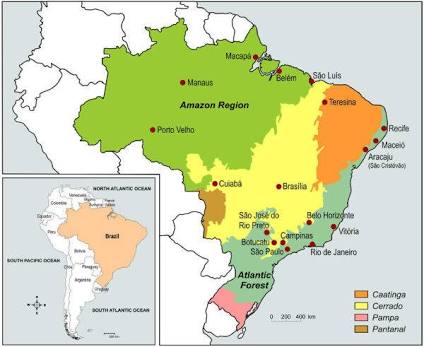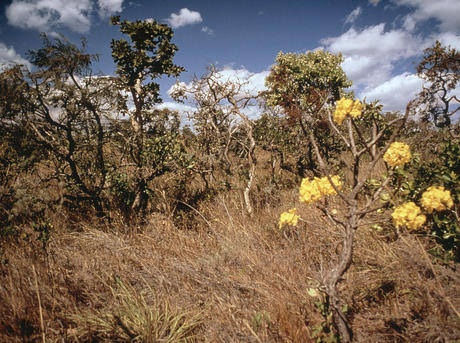When we think of Brazil's natural environment we tend to think of "untouched rainforest".
But this is a really unhelpful framing so here's a quick thread to unpack it:
But this is a really unhelpful framing so here's a quick thread to unpack it:
The Amazon rainforest often seems to be the only thing you hear about, but it's one of *six* important natural environments in Brazil: 

Probably the most important one that you hear less about is the cerrado to the south and east of the Amazon, coloured yellow in that map.
It's a tropical savannah, ie mixed forest/scrub/grass, and this is where most of Brazil's soy and beef is produced.
It's a tropical savannah, ie mixed forest/scrub/grass, and this is where most of Brazil's soy and beef is produced.

Then you have the Atlantic Forest along the coast.
This has been mostly cleared for 400 years and is where most people live, plus where most coffee and sugarcane is grown.
This has been mostly cleared for 400 years and is where most people live, plus where most coffee and sugarcane is grown.

There's also the caatinga semidesert in the northeast inland from Bahia and Recife; the pantanal wetlands close to the Paraguayan border; and the pampas grasslands in the far south.
There's also a distinction around whether or not forest is "untouched".
Primary forest that's never been cleared is only about 40% of Brazil's forest cover. 60% is secondary forest, regrown after being cleared in the past.
Primary forest that's never been cleared is only about 40% of Brazil's forest cover. 60% is secondary forest, regrown after being cleared in the past.
There seems to be a sort of hierarchy in the public mind that's something like this:
1. Virgin rainforest
2. ...
3. ...
4. Regrowth rainforest/virgin savannah/regrowth savannah/everything else
1. Virgin rainforest
2. ...
3. ...
4. Regrowth rainforest/virgin savannah/regrowth savannah/everything else
This is a really unhelpful way to look at it.
For one thing, secondary forest is *really* important. It's 60% of the tree cover and performs up to 80% as well as primary forest in terms of biodiversity and carbon sequestration: sciencedaily.com/releases/2018/…
For one thing, secondary forest is *really* important. It's 60% of the tree cover and performs up to 80% as well as primary forest in terms of biodiversity and carbon sequestration: sciencedaily.com/releases/2018/…
It's also the area that's most often re-cleared for agriculture.
Deforestation in Brazil's primary forest was brought more or less to a halt over the past decade but continues apace in secondary forest, a fact which gets very little attention.
Deforestation in Brazil's primary forest was brought more or less to a halt over the past decade but continues apace in secondary forest, a fact which gets very little attention.
(As an aside, I can't but note that there's a weird set of ideas around "virgin" and "despoiled" forest that seems to derive more from analogy with misogynistic old ideas about women's sexuality than anything to do with land management...)
The other thing is that *we should all be focused on the cerrado, not the Amazon*.
The current fires, and the chainsaw-happy posturing of President Bolsonaro, are obviously very worrying.
But generally the Amazon is pretty well-protected. The real battleground is the cerrado.
The current fires, and the chainsaw-happy posturing of President Bolsonaro, are obviously very worrying.
But generally the Amazon is pretty well-protected. The real battleground is the cerrado.
Soy producers, for instance, have had a moratorium on buying from the Amazon for a decade.
What happens in the cerrado over the coming decades will almost certainty have the more decisive impact on the global climate.
What happens in the cerrado over the coming decades will almost certainty have the more decisive impact on the global climate.
Only about half the cerrado is used for agriculture, and most of that is pastureland.
Farmers tend to clear most trees to make pasture but the real clear-felling comes when you switch to arable crops -- which in the cerrado means soy.
Farmers tend to clear most trees to make pasture but the real clear-felling comes when you switch to arable crops -- which in the cerrado means soy.
Each of those steps usually represents a loss of biodiversity and carbon-fixing.
Pasture at least is quite good at fixing atmospheric carbon -- most of the cerrado's carbon biomass is *below ground* so it can survive occasional bushfires.
Pasture at least is quite good at fixing atmospheric carbon -- most of the cerrado's carbon biomass is *below ground* so it can survive occasional bushfires.
Row crops like soy are much worse though, because each time you till the soil to plant seeds you diminish its capacity to lock up carbon.
There has been some experimentation in the cerrado with silvopasture -- grazing livestock in forest environments. It's possible this could play a big role in making beef farming in the cerrado more sustainable. 

In terms of this year's fires in Brazil, a bit over 50% have been in the Amazon. And they're probably being set by ranchers or would-be ranchers, so it's right that people are freaking out.
But about 30% of fires have been in the cerrado too, and I don't notice #prayforthecerrado being a trending hashtag.
It should be, though! (ends)
It should be, though! (ends)
Oh, one last thing about "Virgin Amazon rainforest".
Much of the Amazon isn't "untouched" at all but the product of specific agricultural practices by Indigenous peoples in the first millennium AD.
Much of the Amazon isn't "untouched" at all but the product of specific agricultural practices by Indigenous peoples in the first millennium AD.
The characteristic Amazon "terra preta" black soil is a thick layer made up of charcoal from hearth fires, smashed pottery sherds, bone, compost and manure.
Large, possibly in some places urbanized societies in the first millennium AD laid this soil down carbuna.com/en/core-info/t…
Large, possibly in some places urbanized societies in the first millennium AD laid this soil down carbuna.com/en/core-info/t…

"Primary forest" is a bit of a misnomer in most parts of the world. What we really mean by it is "not cleared by colonial and post-colonial societies", ignoring the fact that Indigenous societies were active land managers.
Secondary regrowth forest eventually becomes almost impossible to distinguish from primary forest. To a non-expert, that process probably takes no more than 30 or 40 years.
Here's my piece from @bopinion today linking these issues to the U.S.-China trade war: bloom.bg/31YzQSE
• • •
Missing some Tweet in this thread? You can try to
force a refresh








